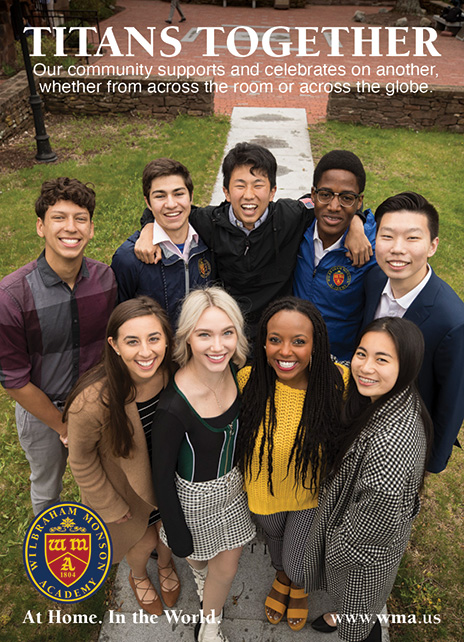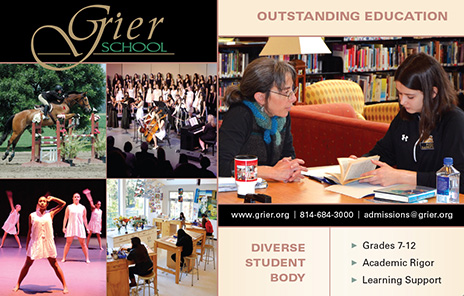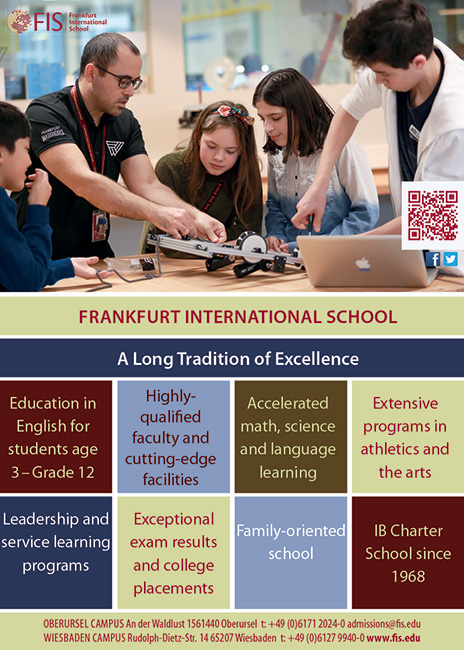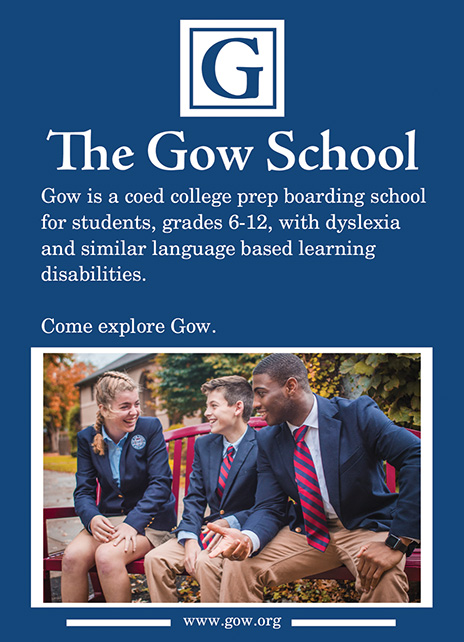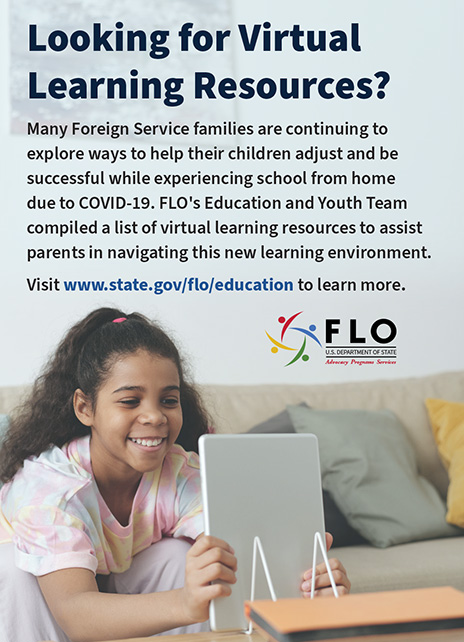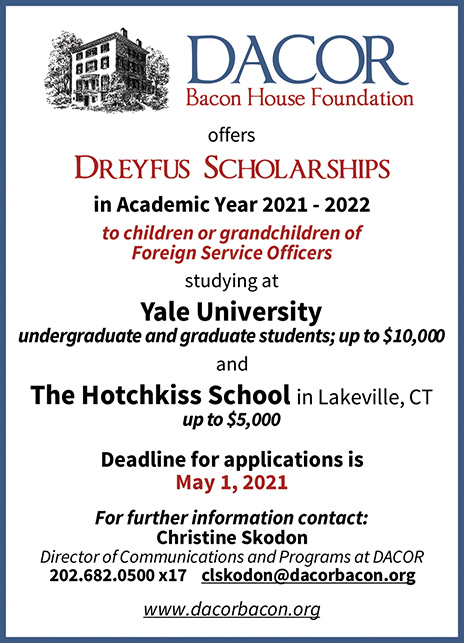COVID on Campus: How FS College Kids and Their Families Are Managing the Uncertainty
One FS parent of a college student candidly recalls the initial days of COVID-19 and shares her experience and that of other families navigating today’s unprecedented circumstances.
BY DONNA SCARAMASTRA GORMAN
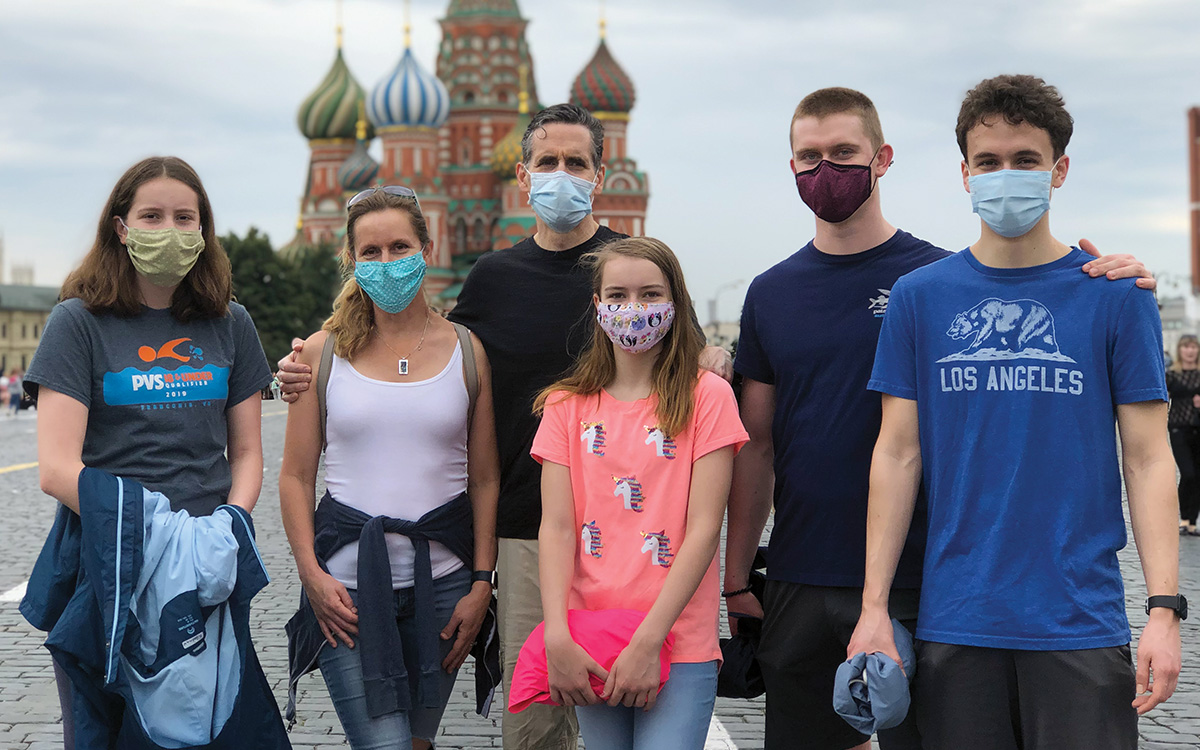
The Gorman family in Red Square after Seamus’ 14-day quarantine.
Courtesy of Seamus Gorman
At the end of February, I flew from Moscow to the United States. The plan was to squeeze in a quick visit with my parents in California before heading to Atlanta on business. But on my second day in Atlanta, it became clear that airports were going to start closing soon. My boss—another Foreign Service spouse—and I decided to fly out on the next available flights rather than stay and risk getting stuck, away from our families at post.
I was waiting at the gate in Atlanta—it was spooky, as I was almost the only person there—when my oldest son called from Virginia with the news that his university was adding a week to spring break while they tried to come up with a plan. “There’s no way they’re going to reopen,” he told me. “I think I should fly back to Moscow now.”
But I told him not to. After all, we didn’t know for sure that his school would move online. This was at the very beginning of the pandemic, when the situation was even murkier than now. If he flew back, he’d risk not getting back to school when classes resumed in two weeks. Better, I told him, to wait it out at his girlfriend’s house and go back to school when it reopened. And anyway, I pointed out, if it didn’t reopen, we could just use the education allowance to fly him back in a few weeks.
Still, I had an impending sense of dread, and found myself really regretting that I hadn’t gone to see him before going to Atlanta. I’ve had some bad experiences as an FS mom: We’ve survived stitches and seizures, broken bones and breakups, and even the infamous “Edamame Up the Nose” emergency room incident of 2010. But this seemed worse somehow. There was a deadly disease jumping international borders, and I was leaving my son to face it alone.
When my plane finally took off, I watched as the little computer image of a plane flew across the map on the seat in front of me. The digital plane flew over Northern Virginia, where my son was now waiting in limbo, and I wanted to cry. It was a sickening feeling, knowing he was down there somewhere, and that I had made the decision to leave him there while I flew home without him. I felt very alone in my sadness and worry.
The Foreign Service Family
But it turns out, I was far from alone. All across the globe, Foreign Service parents and their college-age kids were having the same conversations at that exact same time. What’s going to happen next? What should I do? What if I get sick?
And we parents, for the most part, had no answers for our children. We had the same general thoughts, though: Don’t worry. It’s going to work out in the end. When it’s time, we’ll get you back to post. After all, we have those fancy black passports. We’re not just Americans, we’re U.S. diplomats. We’re used to flying in and out of sketchy situations, and our passports are our shields.
Except this time, the danger was worldwide, and the State Department was directing all its resources into securing our embassies overseas and getting U.S. citizens home. Nobody, it seems, was thinking about that small group of people who desperately wanted to travel in the other direction, who needed to get back into those suddenly locked-down embassies.
That small group of people included my baby.
FS College Students: Not Quite EFMs
Looking for Resources?
While they don’t specifically focus on college students or their families—nobody does!—the Foreign Service Institute’s Center of Excellence in Foreign Affairs Resilience (CEFAR) has a list of resources available at http://bit.ly/CEFAR-resources, including an article about how to support your high school senior as he or she transitions to college (see http://bit.ly/supporting-hs-senior).
In addition, check out the “COVID Coach” mobile app (see http://bit.ly/COVID-coach). Developed by the Department of Veterans Affairs, this free app has self-care tools, including meditation prompts, and trackers to check your mood and help you set daily goals.
To learn about non-COVID State programs for college students that will be helpful both now and when things get back to normal, go to the Family Liaison Office’s webpage College and Beyond (see http://bit.ly/FLO-college-and-beyond).
—DSG
Part of the problem is that, despite the fact that I still see him as my tiny firstborn, the child who loves Tonka trucks and won’t eat vegetables if they are touching on a plate, the State Department sees him as the 6-foot-tall, Selective Service–registered, able-to-vote adult that he is, and they believe that he’s fully capable of living on his own. The truth lies somewhere in between. We parents know our students are capable adults. We also know that they still need us.
I spoke with several FS parents to get their perspectives. One was told that educational travel to her post in Europe wouldn’t be an option. “I was a bit shocked at the idea that a freshman—age 18—didn’t need to come home (as in, to post) in the summer,” says Christina. She had to stay at post when global authorized departure was offered; as a result, she hasn’t seen her freshman in nine months.
And, she continued, the situation was also difficult for her new college graduate. Her daughter was “graduating into a pandemic,” without support and without a job, and yet she was “expected to be old enough to figure it out.” “We managed,” Christina goes on to say. “But I don’t think it was quite reasonable.”
Another FS parent, Dina, was able to take advantage of global authorized departure and returned to the States from her post in the Middle East. “After my freshman son was kicked out of the dorm, with no home to go to, we found a place to stay together,” writes Dina. Her husband, whose job during the pandemic is essential, stayed behind and, consequently, hasn’t seen his family in six months. Since he’s due to leave soon for an unaccompanied tour, the family will likely be separated for at least another year.
Still, Dina isn’t complaining—she’s approaching the situation with the resignation, resilience and humor for which FS spouses are known. Her son is studying to be a pilot, she says, but his university is still online only. “I’m not sure how I feel about a self-homeschooled pilot,” she quips, but at the same time, she feels “incredibly supported by the State Department,” which was able to reunite mother and son amid the pandemic.
One factor that makes all the difference for these parents is which college their kids are attending, as each school has different issues and different policies in place. Tsoniki Crazy Bull, who is currently posted in West Africa, has a student who graduated high school last spring and planned to attend the Institute of American Indian Arts in the fall.
But “IAIA is a tribal college, and these schools are all located on or near reservations, which have been hit very hard during the COVID-19 pandemic,” explains Tsoniki, so the university quickly made the decision to change to an online learning format.
Their freshman wasn’t interested in taking a gap year, and so she adjusted her sleep schedule—she’s six hours ahead of the school in Santa Fe, New Mexico—to allow her to join classes remotely. “I’ve said it’s like practice for when she gets to leave for college,” her mom laughs. “We hardly see each other.”
The family is transferring to Europe soon, which means their freshman will once again have to adjust her clock to keep up with her peers. Says her mom, however, “I have been very thankful as to how IAIA has handled this transition. … Tribal colleges have really stepped up to be leaders during this time, showing what can be done.”
The Dreaded “R” Word
Spend enough time with FS family members, and you’ll hear somebody grumble about the “R” word: resilience. Too often, that word is directed at spouses and children who are expected to step up and deal with all manner of problems and insufferable situations, some of which could reasonably be expected to break a person.
Most of us have dealt with serious illnesses, horrible moves, housing we hate, absentee spouses and posts with no access to decent junk food. Through it all, we’re often told we just need to be more resilient. So we smile on the outside even when we’re wondering how the heck we wound up in this place, crying in the bathroom at noon on a Tuesday because we couldn’t find our way to the grocery store, let alone ask for the right laundry detergent once we finally got there.
It turns out, though, that this resilience, which many of us have spent years cultivating, is what’s getting all of us FS parents through these crazy times. Most of the parents I spoke with were maintaining a positive perspective even in the face of all the unknowns. And while it would be easy to blame the State Department, nobody seemed to know how the department could have done things differently.
Christina says that her kids are “used to me traveling far away, but for me this was different: No way to return in an emergency is hard!” Her children are now settled, well, as settled as they can be during this global upheaval. One is living with a friend, while the other has found employment in her hoped-for field. The family has been lucky, she says, but she hopes that in the future the department will have “better back-up planning” to help families like hers.
What’s Next?
As for us? We finally got our son back to post on a State Department OpMed (Operational Medicine) flight. He’s taking a gap semester (or year? Who really knows?) and working at the embassy—something that certainly wouldn’t be available to him if we were in the States. So the initial negative—feeling like our son was stranded and out of reach—has turned into a positive as he works to make this gap time meaningful.
I’ve been grateful for the supportive community of parents I’ve found since the start of the pandemic. The Foreign Service College Bound Facebook page is full of parents like me, all going through this together and finding different ways to reach that light at the end of the tunnel. My son’s university has a fairly robust parents group, and I was touched by the number of parents, whom I’ve never met and never will, who learned of our situation and immediately raised their hands with offers to help my son move, or to help him safely stay at school if he chose that option instead.
Friends from past posts reached out to offer to move him out, move him in, store his car, feed him. (No small task, that last one. Gone are the days when my baby turned up his nose at foods that touched on the plate; he can now destroy your monthly food budget over the course of a long weekend!)
I have no idea what’s next, for my college kid, for my next-in-line child, who is applying to colleges right now, or for the rest of our family, still locked into Phase 1 here in Moscow. I’m pretty sure the State Department as an institution isn’t coming to save us any time soon. But like many of the parents who spoke with me for this article, I’m feeling more okay as the days pass. We’ll figure it out somehow, together.
Leaving Campus Behind
BY SEAMUS GORMAN
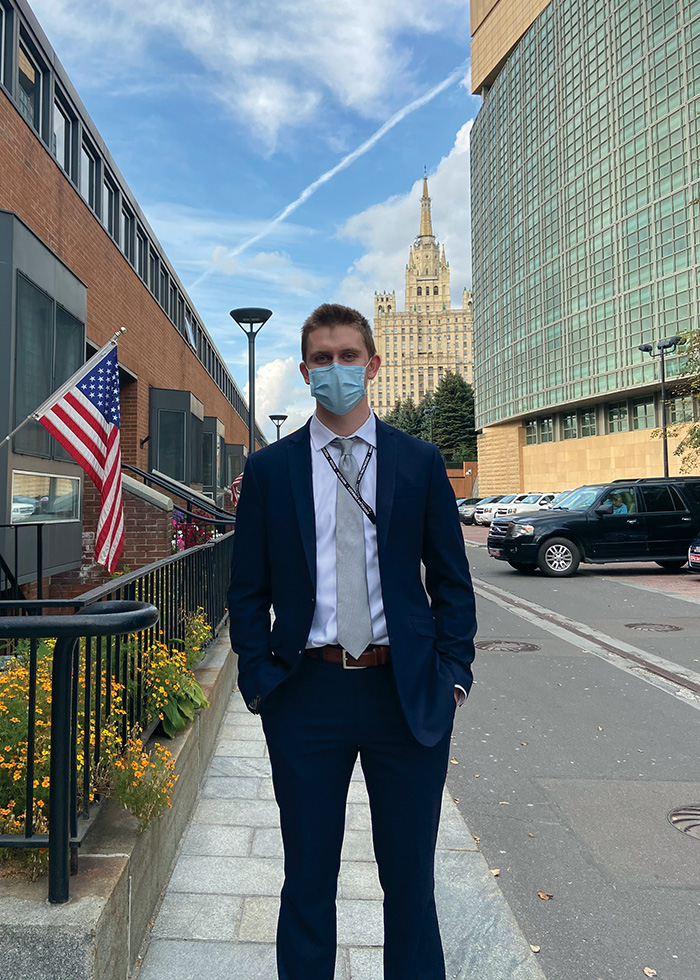
Seamus Gorman on the job, providing VIP visit support in Moscow.
Courtesy of Seamus Gorman
For me, the beginning of March is when COVID-19 transitioned from a frightening story in the news to an event with profound personal consequences. Tom Hanks announced that he had been infected with the coronavirus, the NBA suspended its season and universities across America began to close their facilities. As college students across the United States packed and went home to their families, I discovered I was stuck.
I’m a Foreign Service family member, and the rest of my family was about 5,000 miles away, in Russia. Because of COVID-19 travel bans, getting back there would be extremely difficult—and I wasn’t even sure whether to make the attempt. There were only a few flights into Moscow. I could try to get on one. But if I made it back, I knew I might get stuck again and be unable to return to school in the fall. If I decided instead to stay in Virginia, school might move online, and I would have stayed for nothing. Worse, I knew if I got sick, I’d be on my own.
When the Arab Spring broke out in the early 2010s, my family was posted in Amman. I was 13 years old, and I remember having to pack a go-bag with everything I might need, just in case we had to evacuate in a hurry. We had to prepare for the worst and hope for the best.
This Foreign Service experience from my past helped me navigate the uncertainty caused by the pandemic. What would happen if I got sick? If school shut down? How could I prepare for the worst? The distance between my family and me made the question of what to do more difficult for me than for many of my peers, but my FS experiences better equipped me to handle it.
Ultimately, I decided that the worst case, if I got very sick, would be much easier to handle if I were with my family in Moscow. My State Department connection created a difficult situation because I was separated from my family. But strangely, it also provided a solution: Eventually, through the Operational Medicine program I was able to get on an OpMed flight back to Moscow. And after a 14-day quarantine, during which I did not write this essay as I’d planned, I was finally reunited with my family.
Now back in Russia, I am taking a gap semester. Instead of going to school in Virginia, or logging into online classes, I am working at the embassy and studying Russian—remotely, of course. Instead of walking across campus, I walk around Moscow. Instead of eating at a school dining hall, I am ordering Georgian food na dostavky—for delivery.
My situation isn’t easy—I’m away from close friends and had to put my college career on hold. But I realize I am also extremely fortunate to have the opportunities that being connected to the State Department has given me. I’m living in my parents’ basement, yes, but it’s a pretty interesting place to be.
Read More...
- “College Admissions and COVID-19: An Evolving Landscape,” by Rebecca Grappo, The Foreign Service Journal, June 2020
- “New College, New Culture: Preparing for a Strong First Semester as a Third Culture Kid,” by Hannah Morris, The Foreign Service Journal, June 2017
- “Why some colleges are winning against Covid-19, and others are losing,” by Katherine Harmon Courage, Vox, October 10, 2020






